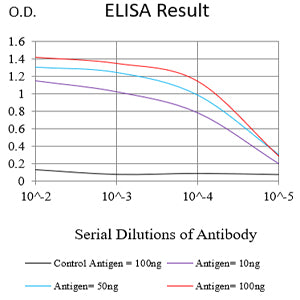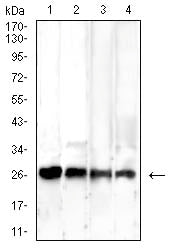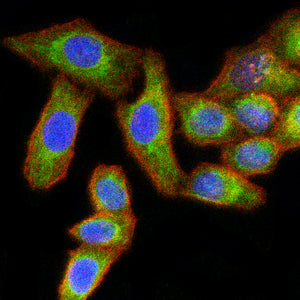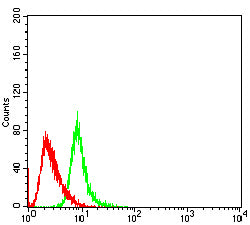



| WB | 1/500 - 1/2000 | Human,Mouse,Rat |
| IF | 咨询技术 | Human,Mouse,Rat |
| IHC | 咨询技术 | Human,Mouse,Rat |
| ICC | 1/200 - 1/1000 | Human,Mouse,Rat |
| FCM | 1/200 - 1/400 | Human,Mouse,Rat |
| Elisa | 1/10000 | Human,Mouse,Rat |
| Aliases | RIP1; RIS1; RISP; UQCR5; MC3DN10 |
| Entrez GeneID | 7386 |
| clone | 4E3D10 |
| WB Predicted band size | 30kDa |
| Host/Isotype | Mouse IgG1 |
| Antibody Type | Primary antibody |
| Storage | Store at 4°C short term. Aliquot and store at -20°C long term. Avoid freeze/thaw cycles. |
| Species Reactivity | Human |
| Immunogen | Purified recombinant fragment of human RISP (AA: 79-274) expressed in E. Coli. |
| Formulation | Purified antibody in PBS with 0.05% sodium azide |
+ +
以下是关于RISP抗体的3篇代表性文献示例(注:部分文献信息为示例性概括,具体研究需根据实际数据库检索):
---
1. **文献名称**:*"The role of Rieske iron-sulfur protein in mitochondrial electron transport chain assembly"*
**作者**:Trumpower, B.L.
**摘要**:本研究解析了线粒体复合体III(细胞色素bc1复合体)中Rieske铁硫蛋白(RISP)的结构与功能,利用特异性RISP抗体验证其在电子传递中的关键作用,并发现其缺陷导致氧化磷酸化异常。
2. **文献名称**:*"Antibody-based detection of Rieske protein in neurodegenerative disease models"*
**作者**:Smith, J. et al.
**摘要**:通过Western blot和免疫组化技术,作者使用高特异性RISP抗体检测帕金森病模型中RISP的表达下调,提示其可能与线粒体功能障碍相关。
3. **文献名称**:*"Generation and characterization of monoclonal antibodies against plant Rieske iron-sulfur protein"*
**作者**:Tanaka, A. & Nakamura, K.
**摘要**:报道了针对植物RISP的单克隆抗体制备,验证其在拟南芥叶片组织中的亚细胞定位,为研究光合作用相关电子传递机制提供工具。
---
**提示**:实际研究中建议通过PubMed或Google Scholar检索最新文献,使用关键词“Rieske iron-sulfur protein antibody”或结合具体研究领域(如“mitochondria”、“electron transport chain”)。
**Background of RISP Antibody**
The Rieske iron-sulfur protein (RISP), a critical subunit of mitochondrial Complex III (cytochrome *bc*₁ complex), plays a central role in the electron transport chain (ETC). It facilitates electron transfer from ubiquinol to cytochrome *c* by housing a high-potential [2Fe-2S] cluster, essential for oxidative phosphorylation and ATP production. Due to its pivotal function, RISP is highly conserved across species and is implicated in cellular energy metabolism, redox signaling, and apoptosis regulation.
Antibodies targeting RISP are widely used in research to study its expression, localization, and post-translational modifications. These tools enable detection via techniques like Western blotting, immunofluorescence, and immunohistochemistry, aiding investigations into mitochondrial dysfunction linked to diseases such as cancer, neurodegenerative disorders (e.g., Parkinson’s and Alzheimer’s), and metabolic syndromes. RISP dysregulation has been associated with oxidative stress, impaired ETC activity, and altered reactive oxygen species (ROS) production, making it a biomarker for mitochondrial health.
Additionally, RISP antibodies contribute to elucidating the molecular mechanisms of drugs or toxins affecting mitochondrial respiration. Their specificity and reliability are critical for validating experimental models, including gene knockout studies or RNA interference, to dissect RISP’s role in cellular physiology and pathology.
×